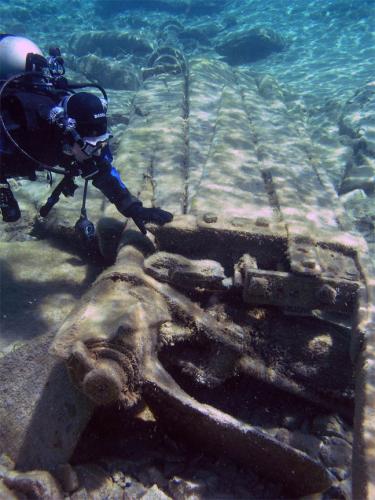Great Lakes fisheries experiences abound in northeast Michigan
Northern Lake Huron is rich in Great Lakes fisheries heritage and tradition, from historic commercial to current day recreational fisheries, offering value for communities and visitors alike.

The coastal Lake Huron communities of northeast Michigan are rich in Great Lakes fish and fishing, heritage and traditions. These Lake Huron fisheries (both fish and people fishing) reflect a way of life for local communities and contribute to sustainable coastal tourism development opportunities as much today as they have in the past.
A diversity of fish—some 115 species—inhabit the waters of Lake Huron providing a wealth of food, fun, ecological and economic values. Anglers enjoy equally diverse recreational fishing opportunities from offshore salmon, steelhead and lake trout to more near shore walleye, perch, pike and bass—among many other species to be caught. Lake Huron also provides the largest catch of lake whitefish, a popular food fish, accounting for approximately half of all whitefish commercially harvested across the Great Lakes. These dynamic and ever-changing Lake Huron fisheries provide many values and benefits across coastal communities of northeast Michigan.
A new Michigan’s Great Lakes Fisheries Heritage Trail offers coastal tourism promise, bringing to life today’s Great Lakes fisheries through exploration of the historic fisheries of our past. This statewide trail highlights a wealth of places and experiences available to those interested in learning more about our Great Lakes fisheries. Michigan Sea Grant and Michigan State University Extension have been collaborating with many museum, university, agency and fishing industry partners from across the state in establishing this heritage tourism trail as a resource for communities and travelers, alike.

- Let’s go fishing! Northeast Michigan offers recreational anglers access to abundant public Great Lakes waters, whether fishing from shore or by boat. Seasoned captains of the Michigan Charter Boat Association offer Lake Huron fishing excursions, including a chance to Catch & Cook your catch of the day. Inland fishing opportunities await on lakes and rivers, such as the famed AuSable River; or enjoy family fishing fun at Cedar Brook Trout Farm in Harrisville, a leader among Michigan’s Aquaculture industry.
- A window to historic fisheries, the Besser Museum for Northeast Michigan in Alpena, offers a chance to explore the commercial gill net tug Katherine V, built in 1928 and operated in northern Lake Huron through the mid-1900s. The NOAA Thunder Bay National Marine Sanctuary protects a nationally important collection of shipwrecks lying in the depths of Lake Huron’s “shipwreck alley,” among which lies the William Maxwell—a wooden fish tug built in 1883 and lost to Lake Huron in 1908. In Harrisville, the Sturgeon Point Lighthouse grounds are home to the Bernice—an historic pound net fishing vessel—among other commercial fishing artifacts. Learn about local school students working with these museum partners to collect and share stories about these historic commercial fishermen of Lake Huron.
- Fish are commercially (and sustainably) harvested from the Great Lakes, still today, offering a living reflection of historic commercial fishing and an opportunity to purchase fish to eat, such as Legends of the Lakes™ whitefish. Fresh fish from Lake Huron are available to you from Bell’s and Big Stone Bay Fisheries in Mackinaw City, as well as Gauthier & Spaulding in Rogers City and the Lixey Fish Market in East Tawas.
- Community festivals across the region often pair Great Lakes fishing with family fun and a community festival atmosphere. From the spring Sucker Fishing Festival in Omer and the summer Alpena Brown Trout Festival, to the fall Great Lakes Fishing Tournament in Rogers City, and the winter Tawas area Perchville Festival, local fisheries are celebrated regardless of the season.
- Northeast Michigan is also home to many of those who study and manage our Lake Huron fish resources. The DNR Fisheries Division’s Lake Huron Research Station research vessel R/V Chinook, located in Alpena, supports the agency’s role in managing Michigan’s fisheries. The USFWS Alpena Fish & Wildlife Conservation Office supports native species and aquatic habitat restoration efforts; while the USGS Hammond Bay Biological Station boasts an important historic and ongoing role toward management of invasive Sea Lamprey in the Great Lakes.
Interested in learning more about these Great Lakes fisheries? Michigan Sea Grant offers educational resources online, including publications such as "The Life of the Lakes: A Guide to the Great Lakes Fishery."
Visiting coastal northeast Michigan? Plan your trip by visiting the U.S. 23 Huron Shores Heritage Route website at http://www.us23heritageroute.org/.



 Print
Print Email
Email

